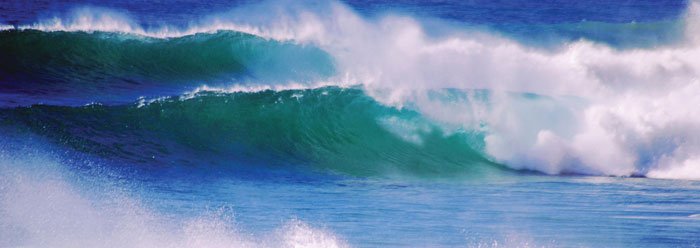The biblical geologic model of earth history is certainly at odds with traditional uniformitarian assumptions. Creation geologist Dr. Andrew Snelling has published a comprehensive two-volume text on the catastrophic nature of earth's recent past.1 In it, he provides powerful biblical and scientific evidence pointing to the young age of our created planet.
For example, consider the accumulated salt in the world's oceans. Evolutionists maintain that the seas--from whence our supposed ancestors generated--are at least three billion years old. However, the low concentration of salt in the oceans calls this great age into question.
There are many other salts in the ocean besides "table salt," which is composed of equal amounts of chlorine and sodium atoms. These solid crystals can be dissolved by water, which separates the elements from one another into individual charged atoms called ions.
Researching the historically possible values, as well as present processes of both output and input of sodium, gives us insight into the ocean's history. Leached sodium ions from weathered minerals is carried to the oceans from rivers and other sources. It has been reliably estimated that 457 million tons of this sodium is added to the oceans annually by river drainage.2
Sodium also leaves the ocean via salt spray and ion exchange in a measured amount. If these rates were consistent throughout the past (a proposition that must be assumed), then salt accumulation can become a kind of clock used to measure the ocean's age. We know how fast salt enters and how fast it leaves. It is apparent that the oceans have not yet reached equilibrium. Instead, they keep getting saltier every year.
By being as generous as we can for the evolutionist regarding sodium input and output rates, the ocean's age is only 40 to 60 million years.3 This obviously is far short of the uniformitarian (evolutionary) age of 3 billion years. But the "40 to 60 million years old" age is considerably more than the thousands of years creation scientists maintain is the biblical/ scientific age of this planet.
The discrepancy lies in the assumption that there was no sodium in the oceans at creation, and that all salt has been added at present rates since that time. However, the modern creation science model of earth's history begins with a saltwater environment in which the newly created saltwater fish would swim. Exactly how salty the oceans were cannot be known. The global Flood added considerable amounts of sodium into the seas due to volcanism (volcanic dust contributes some sodium) and massive erosion.
Critics attempt to blunt the implications with the faulty argument of aluminum accumulation in the oceans. Some maintain that since the current amount of this metal in the seas would indicate the earth was only a century old, the ocean's salt clock is invalid. But unlike sodium, aluminum exits the ocean as rapidly as it enters. The cycle time, technically called "residence time," is short, only about 100 years. This is clearly not true for the element sodium, so the ocean's missing salt refutes belief in an old earth.
Accumulating salt in the ocean does not "prove" anything, but it does deal a death blow to evolutionary ideas. Holding to the well-attested biblical text gives us the true age of the world's oceans--measured in just thousands of years.4
References
- Snelling, A. A. 2009. Earth's Catastrophic Past. Dallas, TX: Institute for Creation Research.
- Meybeck, M. 1979. Concentrations des eaux fluvials en majeurs et apports en solution aux oceans. Revue de Geologie Dynamique et de Geographie Physique. 21 (3): 215-246.
- Austin, S. and R. Humphreys. 1990. The sea's missing salt: A dilemma for evolutionists. In Proceedings of the Second International Conference on Creationism, vol. 2. R. E. Walsh and C. L. Brooks, eds. Pittsburgh, PA: Creation Science Fellowship, 17-33; Sayles, F. and P. Mangelsdorf. 1979. Cation-exchange characteristics of Amazon with a suspended sediment and its reaction with seawater. Geochimica et Cosmochimica Acta. 43: 767-779.
- Morris, J. 2007. The Young Earth, revised ed. Green Forest, AR: Master Books.
* Mr. Sherwin is Senior Science Lecturer at the Institute for Creation Research.
Cite this article: Sherwin, F. 2010. The Ocean's Salt Clock Shows a Young World. Acts & Facts. 39 (7): 16.









